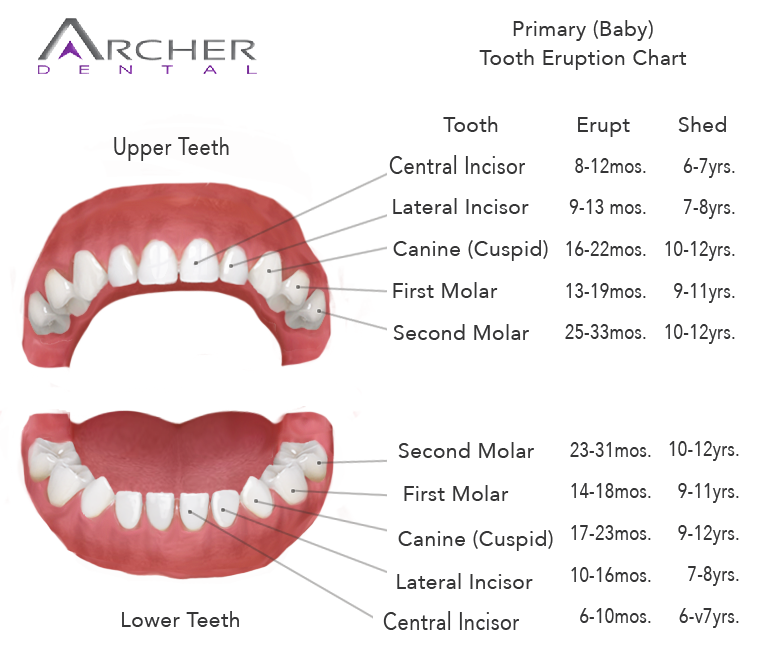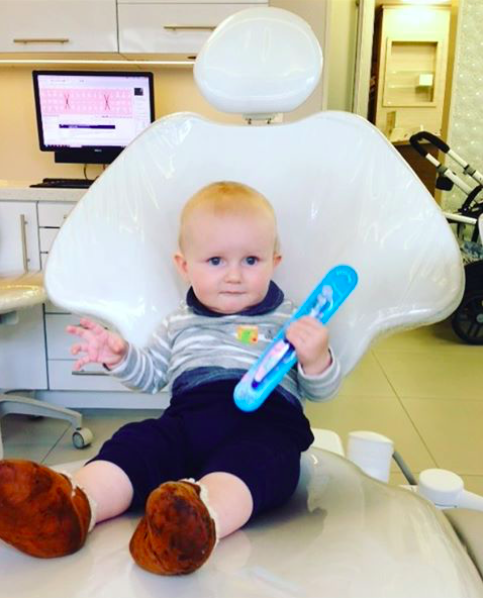
Developing great oral health care habits starts with our kids!
At Archer Dental, we believe these habits are assisted by providing a comfortable stress-free environment where dental care can be fun as well as educational for parents and kids alike. Our team will help you learn about teaching your kids great brushing and flossing techniques that are fun!
We recommend children meet with a dentist within six months of their first tooth or their first birthday, whichever comes first. This allows our team to help parents learn and teach great oral health habits and before bad ones have a chance to start!
- What is a Pediatric Dentist?
- How many teeth do babies get?
- When do Baby Teeth Come In?
- Tooth Sensitivity in Primary Teeth? Can Baby Teeth Become Sensitive?
What is a Pediatric Dentist?
Paediatrics is heath care and medicine for infants, children, and youth under eighteen years of age. Medical doctors who specialize in this area is known as a pediatricians, or paediatricians. The word pediatrics and its cognates mean “healer of children”; they derive from two Greek words: παῖς (pais “child”) and ἰατρός (iatros “doctor, healer”).
Pediatric or Paediatric dentists are dedicated to the oral health of children from infancy all through their teenage years. They have the experience and qualifications to care for a child’s teeth, gums, and mouth throughout the various stages of childhood.
How many teeth do babies get?
Children are born with 20 baby teeth pre-formed in their gums. These are also called Primary Teeth. They will start to erupt at six months of age. They will be shed, which means fall out on their own, at various times throughout childhood. By age 21, all 32 adult teeth or permanent teeth will have erupted.
Natal teeth are what dentists call teeth that appear in newborn baby’s mouths. This can be initially concerning because there are medical conditions which increase the chance of babies being born with teeth, such as a cleft palate or lip. Natal teeth are considered normal occur in about 1 out of every 2,000 births.
When do Baby Teeth Come In?
Even though baby teeth can come in at various ages, this chart will help give parents a general idea. Parents and caregivers can typically expect about four teeth every six months after birth. Here’s the breakdown:

At 6-12 Months – Parents should typically see your baby’s first tooth or teeth between the ages of six to twelve months old. Usually, the two front bottom and top teeth (central incisors) will be the first ones to emerge through the gums.
At 10-16 Months – The central incisors’ neighbors, the lateral incisors, usually show up next. These front teeth can appear anytime but typically erupt between the age of ten and sixteen months.
When do baby canine teeth come in?
At 16-23 Months – Canines, or pointy teeth, usually erupt sometime between sixteen and twenty-three months. At the same time, some first molars, the mouth’s smaller molars next to the canines, may also show up.
When do last baby teeth come in?
At 23-33 Months – The child’s second molars should appear at the back of the mouth.
Thirty-three months is almost three years and while that can seem like a long time to wait before having a full smile of teeth, it’s well worth the wait. Baby teeth help children eat, chew, and learn to speak properly. These teeth develop at the same time as the child starts to eat whole foods and begin to form their first words.
Tooth Sensitivity in Primary Teeth: Can Baby Teeth Become Sensitive?
Children with sensitive baby teeth is increasingly common. If hot or cold foods are causing irritation and discomfort, the child may have developed sensitive teeth. Sometimes, even breathing in cold or hot air can cause pain. While sensitive teeth aren’t necessarily a bad sign, they may point to a more serious dental problem. Sensitive teeth could also be an indication of undiagnosed cavities, tooth decay, or teeth that need to be professionally cleaned right away.
Children can easily develop sensitive teeth because the enamel on their baby teeth is thinner than adult’s teeth , and it’s more easily worn down by plaque and acid. As the enamel wears away, a child’s gums may begin to recede, and cracks can develop on the tooth surface, exposing nerve endings. When the child is drinking or eating anything hot or cold, the vulnerable nerve endings are affected, which leads to pain.
Dental Care for your Whole Family
Archer Dental provides dental care for your whole family. Our services range from preventative dental care to the treatment of complex dental issues using the latest technology.
We aim to provide calm services in settings that your kids will enjoy. The Archer Dental team is friendly and passionate about delivering excellent patient-centered care. We want your whole family to feel comfortable when you come and see us!
Please call us so that we can discuss any questions you may have.


